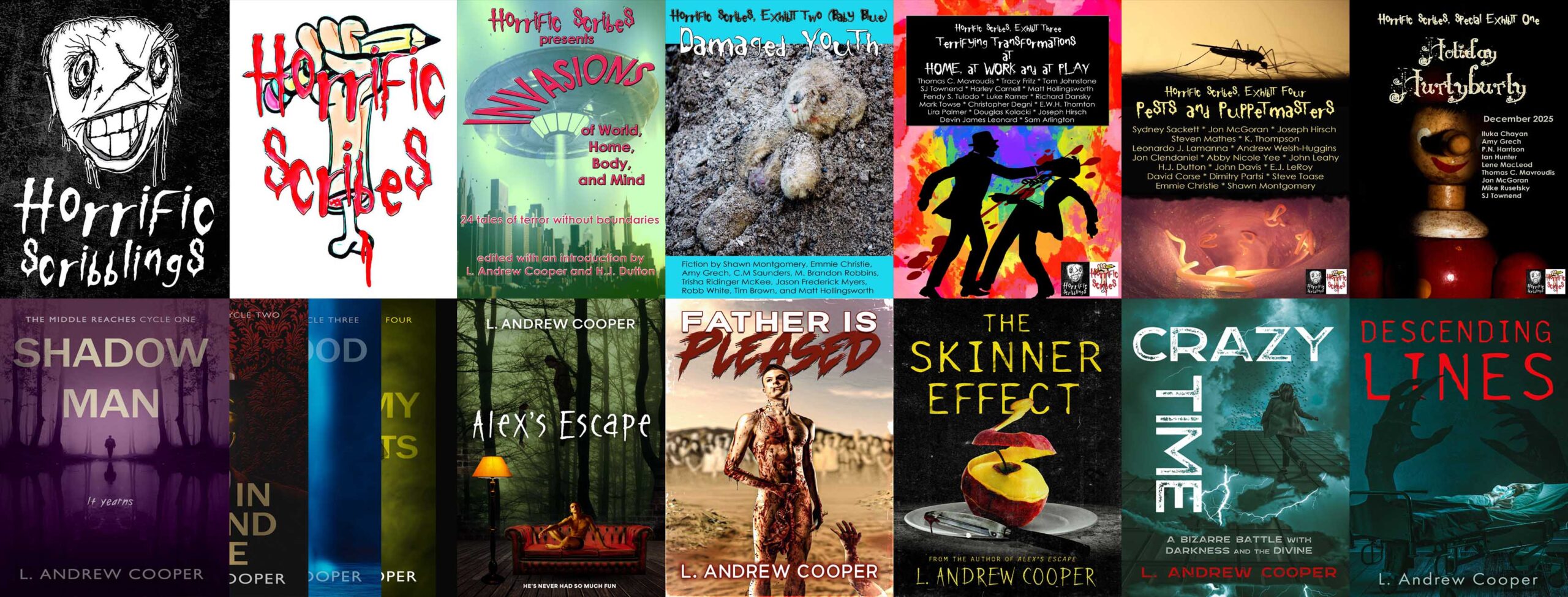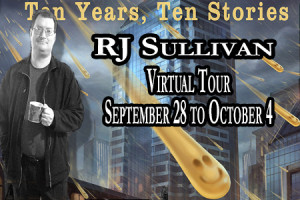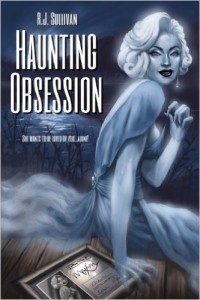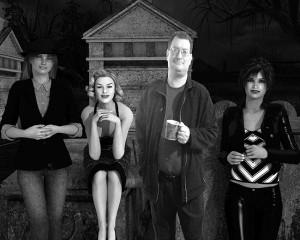Spotlight: R.J. Sullivan’s Darkness with a Chance of Whimsy (2015)
Book Synopsis: Collected for the first time since their initial publications, Darkness with a Chance of Whimsy presents ten tales from the imagination of R.J. Sullivan. Thrills and chills await you, but you may also get blindsided by the absurd. This volume includes a pair of stories featuring Rebecca Burton, the mysterious investigator of R.J.’s acclaimed paranormal thriller series. Among the ten stories, you’ll find “The Assurance Salesman,” who shows five strangers more about themselves than they ever guessed; you don’t want to venture into Daddy’s basement in “Fade;” Rebecca Burton tries to talk someone out of a bad idea in “Backstage Pass;” a bullied police detective finally defeats his rival in “Able-Bodied;” a desperate father finds the “Inner Strength” to save his young daughter, “Becky” Burton; a child seeds his aquarium with a most unusual “Starter Kit;” and a brilliant robotics engineer creates a “Robot Vampire.”
For Cooper’s review, go here. Otherwise, proceed to the…
Interview
Starter Question. What do “darkness” and “whimsy” mean in this book’s galaxy? When do they belong together, and why? How do you know when to favor darkness and when to take more of a chance on whimsy?
SULLIVAN: The title speaks to the idea of not taking myself too seriously, and that most of my stories and specifically the ones in this collection are all dark in tone, but have some element that, on the surface at least, is rather silly. “Robot Vampire,” which closes the collection, is the most obvious example. It’s a dark tale that takes itself very seriously within its own context, but a reader can take a step back and see the whimsy of the idea—Robot Vampire. How does that even work? Also in the collection is a whimsical look at future Spellcheck, a portal story, a magical gem, and a telepathy helmet, to name a few. They are all whimsical ideas, but set within a dark tone.
Grammetiquette 2015. Your writing reveals a strong sense of craft as well as self-consciousness about your own and others’ uses of English. Particularly since you write about both past and future, what are your views on “standard” language, and how important are grammar and mechanics for writers of horror and science fiction?
SULLIVAN: First of all, thank you for the compliment. Yes, I do believe that a writer’s first priority is learning and mastering the standards of the English language. I spent several years employed as a proofreader, and frequently would shake my head when people would throw something together and say “the proofreaders will fix it.” I see the same “let the computer take care of it” mentality now being applied to spell checkers and grammar checkers. If this trend continues, it could easily lead to the sort of scenario that “Grammatiquette 2030” illustrates.
Character Strength. This collection spans a decade of your development as a writer and covers a lot of ground in terms of both genre and themes. As I see them, one of the stories’ greatest commonalities is that all involve serious character study. How do your characters relate to your uses of genre and theme, and why is character so prominent in your work? Who’s your favorite, and why (yes, I am asking to you to choose among your offspring)?
SULLIVAN: Genre, whether horror or science fiction, really only describes the setting and tone of the story. I’m not as interested in someone being stalked by a vampire or a spaceship launching to go off to war as I am the person’s response to being stalked or the captain and crew of that spaceship. I suppose in SF terms that makes me a “soft” SF writer, and in horror, that’s just the standard approach. As a reader, I need to care about the person this is happening to; the rest is just window dressing.
As for a favorite… in the case of this collection, I would have to pick the robot in the robot vampire. Without getting too far into spoiler territory, the machine is accidentally imbued with cognizance and crosses that line between machine and self-awareness. It was a tricky line to walk, to imagine that ah-ha moment when a being realizes what it is, where it is, why it was created, and how it will respond to this world it’s been dropped into. To have so many readers respond at how much Jinan touched them was rewarding, because I knew I had, for those readers at least, pulled it off.
Able-Written. You don’t shy from potentially difficult subjects, such as disability in “Able-Bodied” and the historical struggles of LGBTQ communities in “Backstage Pass.” What draws you to these subjects, and what roles do they play in your work?
SULLIVAN: Writers by nature are observers of the world. The struggle of the LGBTQ community is the ongoing civil rights success story of the last couple of decades. Anyone paying attention has known someone who came out or who has lived openly and received some sort of grief for trying to do so. In my own experience, I’ve witnessed the majority view shift from the early 1980s when information and personal acquaintances were both difficult to find, to the early 2000s when both were much more accessible. I know I personally moved on the issue a great deal. Anyone open to it realized that the propaganda put out there was designed to discard the humanity of others while isolating one personal practice (between adults of mutual consent and in private, to add to the silliness) that was literally demonized to the point it perpetuated fear from both sides for several centuries. But then there was a shift, and most of us had a few acquaintances who got brave, came out, and told people their stories. Acquaintances turned into friendships, and when you become invested in your friends, you want the best for them, and you get angry when they’re disrespected for ridiculous reasons. The same is true for depression, which seems to hit creative people particularly hard, and of course skin color, a bigotry which continues in spite of all common sense. These things are a part of what I’ve seen, and I’ve been affected by them, so they’re a part of my work.
I Will Have Remembered Clearly. Your bio mentions Andre Norton and Gene Roddenberry , but as I read, I found myself thinking back even further to folks like Nathaniel Hawthorne (the short stories) and Ambrose Bierce, even Henry James and yes, Bram Stoker (mostly works beyond Dracula). Do you feel your roots reaching to the nineteenth century? And where do you see yourself as you send your probes forward?
SULLIVAN: This question comes as a surprise to me. I had the same basic literature classes as any other college major, but beyond a fascination with Poe, Arthur Conan Doyle, and, well, okay, H.G. Wells, my reading tastes fall decidedly 20th century. I still cite Asimov, Andre Norton, Robert Heinlein, Rod Serling, and others from that era as my primary “fun” reading, though I have of course read Stoker’s Dracula, Mary Shelley’s Frankenstein, and the others you mentioned I’m sure are in my Norton Reader. J I suppose these authors may have influenced the authors I read, and I somehow channeled those qualities. How’s that for a whimsical notion? My plan first and foremost is the same as it ever was—to tell stories that fascinate and entertain me, and hope that my readers feel the same. I’ll do this in the style that seems to fit best and let bloggers like you analyze where it all might come from.
Thanks for the great questions!
THANK YOU!
Author Links
Website: http://rjsullivanfiction.com/
Facebook: https://www.facebook.com/R.J.SullivanAuthor
Twitter: @rjsullivanauthr



